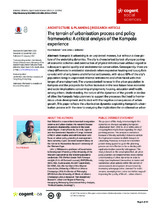The terrain of urbanisation process and policy frameworks: A critical analysis of the Kampala experience
Abstract
Kampala is urbanising in an unplanned manner, but without a clear picture
of the underlying dynamics. The city is characterised by lack of proper zoning
of economic activities and construction of physical infrastructure without regard to
subsequent spatial quality and environmental conservation. Consequently, there are
sharp differences in residential standards where expensive housing and luxury flats
co-exist with shanty towns and informal settlements, with about 60% of the city’s
population living in unplanned informal settlements and often faced with challenges
of unemployment. The unprecedented increase in the urban population in
Kampala and the prospects for further increases in the near future have economic
and social implications concerning employment, housing, education and health,
among others. Understanding the nature of the dynamics of the growth or decline
of cities like Kampala helps planners to support the processes that lead to harmonious
urban development and to deal with the negative consequences of urban
growth. This paper reflects the urbanisation dynamics explaining Kampala’s urbanisation
process with the view to analysing the implications for an alternative urban policy framework. It argues that the conditions that have allowed the situation to
exist have serious policy implications which require the need for an integrated policy
framework that can be used to effectively prevent or halt Kampala’s unplanned
urbanisation while promoting planned urbanisation. Induced by the migration and
lack of information, understanding urban dynamics is crucial to the development of
urban policies that can effectively ensure that further urban changes occur in a systematic
and satisfactory manner. The current urban process in developing countries
like Uganda is associated with poverty, environmental degradation and population
demands that outstrip service capacity.

